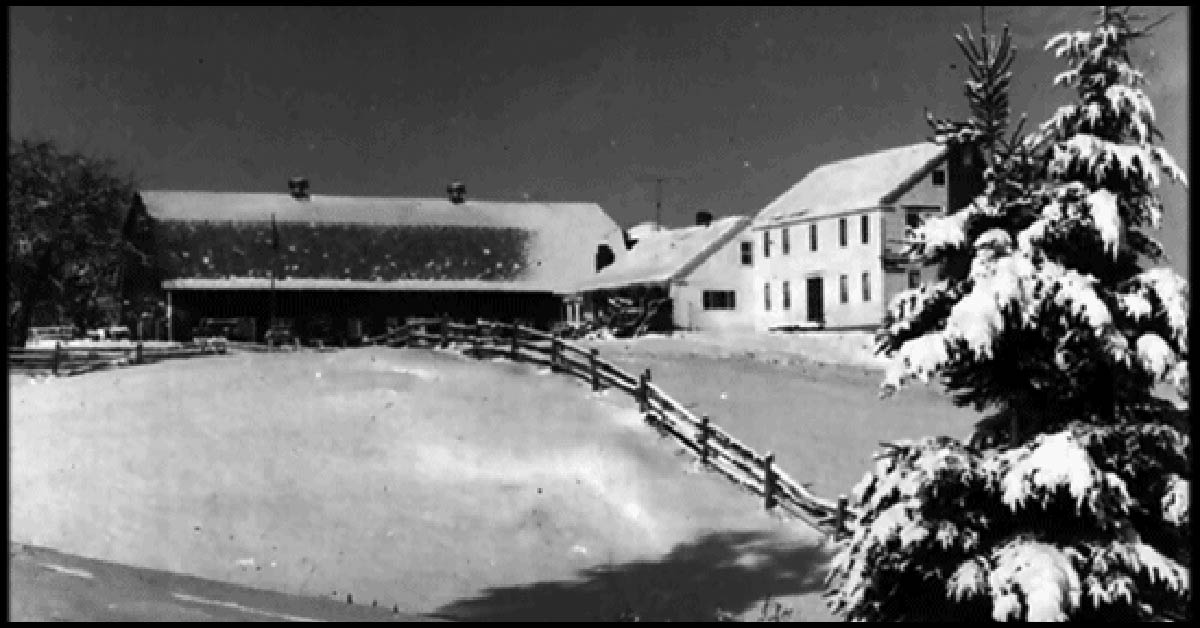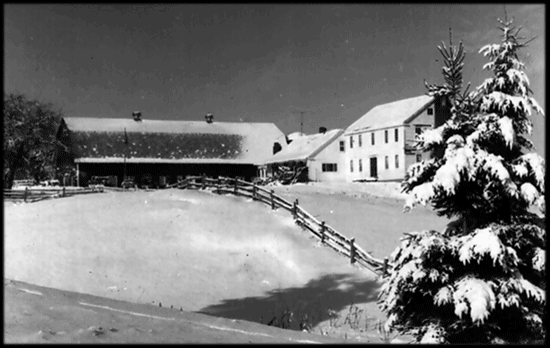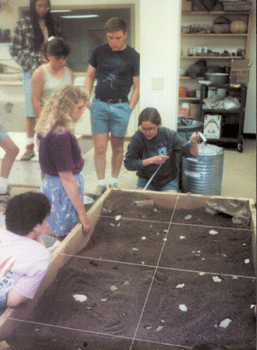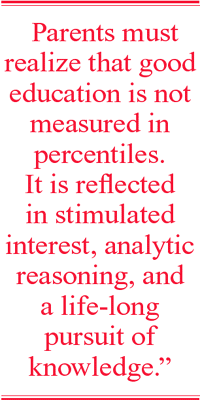A Mind of Their Own
By Lawrence Bangs
Printed in Practical Homeschooling #11, 1996.
 How to get back the wonder of learning things for our children
How to get back the wonder of learning things for our children

|

As the Great Depression loosened its grip upon America, her young people
were enthralled by a technological miracle unfolding in their Weekly
Readers. A two hundred-inch telescope was constructed at Corning, New
York, and successfully transported to Mount Palomar in California.
Mankind was about to peer further into space than ever thought possible.
Teachers and parents, with well-developed adult minds, piqued the
curiosity of young students by asking, “What will they see? What lies
beyond the limits of our vision?” Children wondered about their
universe, about their world, about themselves. They asked questions.
They sought answers.
Today we have a similar instrument in orbit. The Hubble telescope
reveals objects which once lay beyond the imagination of mankind. Today
we know about the blueprint of life called DNA. We have immediate access
to information stored anywhere in the world. We have the capacity of
formulating more detailed theories than ever previously conceived, more
accurate explanations than ever previously imagined, and more elaborate
solutions to the questions which have taunted us since we acquired the
capacity to think.
Our children, therefore, should be the most excited, most curious, most
dedicated scholars the world has ever known. They should be so awed by
the power of their own minds that the ingestion of mind-altering
substances should be unthinkable. They should be dedicated to mastering
the vast accumulation of human knowledge. This should be their most
treasured possession, theirs to draw upon and theirs to expand. They
should be elevated to a level of intellect transcending all the
pettiness through which mankind has had to pass. They should be all of
these, but they are none.
“No One Loves a Feller who’s a Social Disease”
In the fifty years between Mount Palomar and the Hubble telescope, we
have robbed our youth of their innate curiosity. We have converted them
from intellectual beings into social problems. We have chained them in
the caves which Plato describes in Republic and forced them to gaze at
the false images of dead screens which divert attention from reality. We
have turned their gaze from the raw power of the supernova in the Crab
Nebula and shown them instead the unreality of Star Trek. We have
degraded the wonders of DNA by stifling their curiosity with the wild
scenes of Jurassic Park. We have used the computer to divert their
attention to the sterile world of Nintendo, away from glorious
spectacles such as the Grand Canyon or the Milky Way.

|
|
A Wildridge Academy student receives insruction from Crow Cannon archaeologists on the proper way to dig a site.
|
Who does all this to our children? We do. We are responsible. We are the
parents. We are the schools. We support the structure which feeds the
poisonous television sets. We are the blind who do not see what we do.
We channel their attention onto the murky screen rather than stimulate
golden thoughts in their minds. We fix our gaze on price tags and social
status. We leave our children languishing in daycare centers and schools
which rob them of individual thought, accomplishment, and satisfaction.
Mind or Ego?
We have allowed our schools to focus on the ego rather than the mind. In
the small town of Newark, Vermont, the 1995 school budget appropriated
over $20,000 for social and psychological services and $37 for
curriculum development. School teachers in Bennington, Vermont, are more
concerned with one-way glass to develop psychological profiles than
two-way glass to develop the minds of the children. Teachers in training
are exposed primarily to psychology courses designed to foster a child’s
self-esteem. Student teachers devote little time or effort to learn the
astronomy, history, mathematics, or art which would expand a child’s
mind. Scholarship is gone from the classroom. In its place are teaching
assistants who are unaware of a sum total of human knowledge or any
subtotal thereof. They cater to the social and psychological needs of
the child, ignorant of the existence and the power of the child’s mind.
In a recent interview on public radio, the editor of the Louisiana
Penitentiary newspaper made a vital observation. He acknowledged that he
was confined for life without hope of parole, then admitted that his
first years in prison had been devoted to causing trouble. When bored
with troublemaking, he went to the prison library and discovered the
power of his own mind. He concluded, “If only I had made this discovery
before I took up crime I would not be here today.”
Look around and see how many mindless criminals fill our prisons and
streets. Notice how many mindless adults escape the confines of a cell
but pass through life imprisoned by their own crippled intellect,
seeking only to possess the accepted look or to say the accepted thing.
Young minds are the fertile soil in which productive ideas grow. Our
schools are sowing salt, not seeds. The fertility of young minds is
destroyed by texts void of truth and stimulating thought.
In 1944 the population of New York City was very close to what it is
today. Then, there were less than 50 murders a year. Now, there are
almost 1,500. This is thirty times as many. Teenage pregnancy, drug use,
and welfare applications have increased in the same proportion. In the
same period, the increase in the amount of money spent on education has
far exceeded the inflation rate, but our collective performance on
scholastic tests has dropped from the top in international scoring to
the bottom. Textbooks have been revised by committee after committee
until any idea which might stimulate a young mind has been deleted
because there might be some offense. Consequently, our young minds
atrophy.
Children Need Adults
Our species possesses something which no other species can claim—a vast
reserve of knowledge. All manner of humans have contributed to this treasury,
and all may draw upon it. We have been able to accumulate and
preserve this precious collection because our design is different from
that of any other species. Where most species achieve maturity in six
months to four years, our young are blessed with an extended childhood
which stretches for 18 to 21 years. They have 20 years to be exposed to
the adult mind, to learn through emulation, discussion, and observation.
John Locke says, “The Power, then, That parents have over their
children, arises from that Duty which is incumbent on them, to take care
of their Offspring, during the imperfect state of Childhood. To inform
the Mind, and govern the Actions of their yet ignorant Nonage, till
Reason shall take its place, and ease them of that Trouble, is what the
Children want, and the Parents are bound to.”
When we produce children, we must accept the responsibility which
extended childhood imposes. We must develop the innate curiosity of the
child into the superior intellect of the adult. This is accomplished by
allowing the child easy access to the adult mind. The child imitates the
adult in play. The adult corrects misconceptions and provides access and
direction to the vast reserves of human knowledge.
This was once done in school, but now must be done at home. Daycare,
kindergarten, and lengthened school years expose the child to an
atmosphere dominated by children. The child is reared in a world created
and controlled by peers. Roles are reversed. Teachers imitate the young.
The opportunity to observe and imitate adults is corrupted by an
environment augmented by Barbi and her friends. The valuable lessons,
such as how to crack an egg and what develops if it is incubated, are
never taught and curiosity is squelched. Values degrade into a question
of what will bring immediate satisfaction. The adult approach to life
does not develop.
Such disregard for knowledge has occurred before. It produced a Dark Age
where knowledge languished and suffering multiplied.
In previous times when mankind has rejected learning, there has always
been a cell of knowledge which has been retained. As Rome decayed, the
library at Alexandria preserved much of its accumulated wisdom. In the
Dark Ages, monks in Ireland copied manuscripts and preserved the
knowledge of the past.
Today a cell for the preservation of erudition seems to be emerging. It
is called “Home Education.” It bears the hope that children may continue
personal contact with a well-developed mind, to help the child discover
the vast power reserved within the recesses of its own mind.
Study Great Men
What must a parent do to accept this overwhelming responsibility?
Show your child the value of strong character. Our knowledge has been
accumulated for the most part by individuals. Some individuals have made
vast contributions, others have added only tiny fragments. Studies of
the people who have made the contributions are as meaningful as the
study of their works. For example, Heinrich Schliemann excavated Troy,
Mycenae, Tiryns, and other sites where ancient Greeks once lived. His
autobiography is recorded in his descriptions of his diggings. He tells
of childhood dreams of finding Troy. He explains how he educated himself
to accomplish his dreams, and how he worked to amass the fortune that
would enable him to accomplish his goal.
Champollion, who used the Rosetta Stone to decipher hieroglyphics,
offers another inspiring biography. He viewed the Rosetta Stone when a
young man and declared, “I will decipher it some day.” He did much to
educate himself to accomplish the challenging task.
The biographies of men such as Galileo, Edison, Frederick Douglass, Mark
Twain, Booker T. Washington, Teddy Roosevelt, and Howard Carter, who
excavated Tutankhamen’s tomb, illustrate the responsibility we assume
when we attempt to educate ourselves. Each of these people removed a
barrier which blocked mankind’s view of a bigger world. Most of these
men were educated, at least in part, at home, and most educated
themselves. Their first discovery was always the same: they all
discovered the power of their own minds.
The “Fun Trap”
Parents must show their children the variety of problems solved by the
human mind and the joy which is the reward of accomplishment. Children
want to have fun. This has led many educators into the “fun trap.” They
attempt to make learning and everything concerned with school fun. This
produces a frivolous attitude toward work. The child who has the
opportunity to study the adult mind discovers the fine distinction
between having fun and enjoying one’s work. Schliemann, Champollion,
Teddy Roosevelt, Howard Carter, and Booker T. Washington all enjoyed
their work. Each found work which was exciting, rewarding, stimulating,
enjoyable, but hardly fun. A study of how the human mind has achieved
“impossible” goals elevates a child’s expectations from fun to
satisfaction.
Introduce children to the mysteries of our world. Let them discover for
themselves what was discovered by someone long ago. Read with them
Galileo’s Starry Messenger. With binoculars, find the moons on Jupiter
and record their changes. For the child this is not rediscovery, but
discovery. Let them wonder why the circumference of the great pyramids
divided by its height is equal to pi. Why does the Sphinx stare at the
rising sun at the vernal equinox? Was there an Atlantis? Why does the
coast of Antarctica appear accurately on ancient maps 200 years before
the Europeans ever discovered its existence? Is there a last galaxy at
the edge of the universe?
Virtuous Reality
The wonders of the universe are only seen by those who are allowed to
wonder.
Put your child in contact with reality. Show them the galaxy of
Andromeda and the Horse Head Nebula in Orion. Reveal the life found in a
mud puddle or in brooks, but not in a kit. There is no life to be found
in packaged science. Stand on the rim of the Grand Canyon and follow the
layers across the plain. Take them to a pond to snorkel, bicycle with
them about the battlefield at Gettysburg, or ride together across your
state. Call your state geologist or archaeologist and learn about the
past which surrounds you everyday.
Let your children see that mistakes are part of learning, that wrong
ideas detected and corrected are the basis of our vast collection of
knowledge. Explore with them and show them how an adult can use
curiosity to learn, grow, and develop intellect.
Read together and read aloud. Read Book VIII of Plato’s Republic: the
decay of democracy. Read it and illustrate each step of decay by reading
from any New York Times. Ask how one who lived in Athens 2,500 years ago
could give such an accurate picture of New York City or Los Angeles.
Discuss it and watch your child’s mind grasp ideas written two and a
half millennia ago.
The child who is stimulated by reading and discussing Plato may pursue
an idea into John Locke or Thomas Paine. This is the goal of education,
to pique the curiosity and stimulate the young mind to educate itself.
Our teachers are trained to measure and classify. When interest is
stimulated, marks are immaterial. Parents must realize that good
education is not measured in percentiles. It is reflected in stimulated
interest, analytic reasoning, and a life-long pursuit of knowledge.
The Test of Life
I tried to explain this to a superintendent of schools. “How do you know
you haven’t overlooked something?”, she asked. I told her I send them
into the world and watch them succeed. She replied, “You don’t
understand. Suppose they can not pass some test?” I replied, “No. You
don’t understand. The only test you can’t retake is the test of life.”
All of the child’s needs may be met at home, free from the threat of
senseless quizzes, tests, and measurements.
Why must this be done at home? Isn’t this what is supposed to happen in
school? Plato explains our schools to us, “In such a state of society
the master fears and flatters his scholars and the scholars despise
their master and tutors; young and old are alike; and the young man is
on a level with the old, and is ready to compete with him in word or
deed: and old men condescend to the young and are full of pleasantry and
gaiety; they are loth to be thought morose and authoritative, and
therefore they adopt the manners of the young.”
 Our classrooms, be they daycare, elementary or high school, are
dominated by children. The children select the study plan. They dominate
the discussions. They deny themselves the opportunity to grow, then
resent reference to peer pressure and their inability to function as
maturing individuals. Unfortunately, their teachers join in their
immaturity. The teacher imitates the student, perpetuating ignorance
rather than dispelling it.
Our classrooms, be they daycare, elementary or high school, are
dominated by children. The children select the study plan. They dominate
the discussions. They deny themselves the opportunity to grow, then
resent reference to peer pressure and their inability to function as
maturing individuals. Unfortunately, their teachers join in their
immaturity. The teacher imitates the student, perpetuating ignorance
rather than dispelling it.
Hope for future generations lies in the parents who accept the
responsibilities and arduous duties imposed by home education. The
conditions that provide the necessary contact with adults prevail in
small, home-style groups.
Family schools have the courage to expose the child to ideas. Only
parents have the strength to say, “I don’t know myself, so let’s find
out together,” and “Of course you don’t like music. You don’t know
anything about it! Study it first and then make up your mind.” Only
parents have the authority to say, “These were good people. How can we
be like them?”
Only in a strong home can children be made to realize that there is
right and wrong. Only in the home can we escape the domination of the
ego which prevails in our socially-oriented schools. But most
importantly, only in the home can we divert attention from grades,
labels, and measurements and focus instead on interest, knowledge, and
learning.
If you have children, accept the responsibility John Locke defines.
Yours is the adult mind which your children would most like to emulate.
You have them only once and for a few short years. Enjoy learning with
them. Give them the full opportunity to escape the ignorant state into
which they are born, but which they do not have to perpetuate. Teach
your children as much as possible at home. Nothing can match the
satisfaction of seeing a new generation step forth equipped with
functioning minds.







 Our classrooms, be they daycare, elementary or high school, are
dominated by children. The children select the study plan. They dominate
the discussions. They deny themselves the opportunity to grow, then
resent reference to peer pressure and their inability to function as
maturing individuals. Unfortunately, their teachers join in their
immaturity. The teacher imitates the student, perpetuating ignorance
rather than dispelling it.
Our classrooms, be they daycare, elementary or high school, are
dominated by children. The children select the study plan. They dominate
the discussions. They deny themselves the opportunity to grow, then
resent reference to peer pressure and their inability to function as
maturing individuals. Unfortunately, their teachers join in their
immaturity. The teacher imitates the student, perpetuating ignorance
rather than dispelling it.
